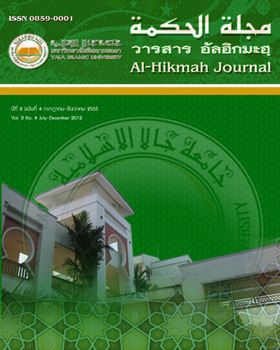Islamic world view of Balance (Al-Wustiyah): It's implication to Socio-economic, political and education.
Abstract
The forth characteristic of the Islamic concept is “Al wasatiyah / Attawazun“ which means balance proportion or moderation , which cover its foundation concept, basic element and ramifications, and which linked with the characteristic of illimitability or “Shumul“, in other word we can combine both the characteristics and call it “balanced illimitability“ . Applying the concept of balance in social, political, economic, and education will created justice in society.
In Islam, justice in this comprehensive sense is a fundamental obligation. Injustice is one of the horrified capital sins in Islam, and its perpetrator shall be required on the day of reckoning to bear the burdens of the shortcomings of his victim.
This paper is discussing on the concept of the balance in Islamic world view, and its implication to socio-economic, political, and education. The paper discusses the balance of compulsion and freedom, compatibility between worship and place of humanity, balance relationship between God and man, the concept of balance in education, the concept of balance and social transformation, effect of balance in epistemology, effect of balance on economic activity, the impact of concept balance on political life.
This paper will be beneficial to reader concerning Islamic world view on concept of balance and its implication to socio-economic, political, and education, Insha Allah .
References
Abdul Muheimin Abdul Karim. "Al-Nahdah", Journal RISEAP. Vol 20, p 3.
Ahmad bin Haji Mohd. Salleh. 1989. Kursus Pendidikan Islam. Kelantan: Pustaka Aman Press. Sdn. Bhd..
¬¬¬______. 1997. Pendidikan Islam: Falsafah, Pedagogi Dan Metodologi. Shah Alam: Fajar Bakti Sdn.Bhd..
al-Attas, Shik Muhammad Naquib. 1987. Konsep pendidikan Dalam Islam: Suatu Rangka Fikir, Pembinaan Filsafat Pendidikan Islam. Bandung: Penerbit Mizan.
al-Banna, Hasan. 1981. Kunci Memahami al-Qur’an. Singapore: Pustaka Nasional Pte. Ltd..
al-Faruqi, Ismail R. 1990. Fikiran Dan Budaya Islam. Kuala Lumpur: Dewan Bahasa Dan Pustaka.
Azam Hamzah dan Zulekha Yusoff. 1990. Tamadun Islam: Konsep dan Pencapaiannya. Kuala Lumpur: Hizbi.
Desuki Haji Ahmad. 1978. Ikhtisar Perkembangan Islam. Kuala Lumpur: Dewan Bahasa dan Pustaka.
Hamka, Abdul Malik Karim Amrullah Dr., Haji. 1980. Sejarah Umat Islam. KualaLumpur: Pustaka Antara.
Hasan Langgulung. t.t. Beberapa Tujuan Dalam Pendidikan Dalam. al-Qur’an. terj. Abdullah Hj. Salleh. Pustaka sa.
______ .1991. Pendidikan Islam Menghadapi Abad Ke-21. Shahlam: Hizbi.
______. 1991. Asas-Asas Pendidikan. Kuala Lumpur: Dewan Bahasa Dan Pustaka.
Muhammad al-Ghazali. 1998. Dialoq dengan al-Qur’an. terj. Mardiyah Syamsuddin. Kuala Lumpur: Jasmin Enterprise.
Shalaby Ahmad. 1970. Sejarah dan Kebudayan Islam. Singapura : Pustaka Nasional.
Subhi Salih .1991. Kajian al-Qur’an. Terj. Zinal Abidin bin Abdul Kadir. Edisi 2. Kuala Lumpur: Dewan Bahasa Dan Pustaka, KPM.
S.S. Husain, S.A. Ashraf. 1989. Krisis Dalam Pendidikan Islam. terj. Masa’od Abdul Rashid. Kuala Lumpur: Dewan Bahasa Dan Pustaka.
Yusuf al-Qardawi. 1989. Al-Khasais al-cAmmah lil Islam. Kahirah: Maktabah wahbah.



